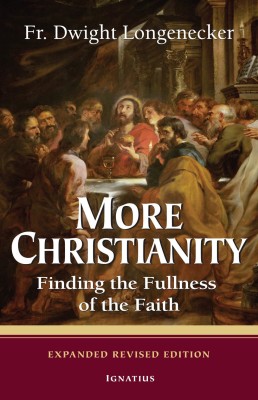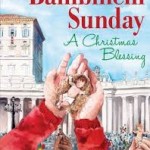 I returned to the Church through the side door. I had slipped away into agnosticism during college; when I’d reached the fullness of emptiness down that hallway, I wandered back Churchward via an initial false start at the U.U., and then a second attempt that landed me at a non-denominational, Evangelical congregation. I can say without doubt that half my authentically-Catholic Christian formation was delivered to me by Evangelical hands.
I returned to the Church through the side door. I had slipped away into agnosticism during college; when I’d reached the fullness of emptiness down that hallway, I wandered back Churchward via an initial false start at the U.U., and then a second attempt that landed me at a non-denominational, Evangelical congregation. I can say without doubt that half my authentically-Catholic Christian formation was delivered to me by Evangelical hands.
My husband remained a Protestant for another decade, though the first few years after my reversion were the most intense. I had to mount a defense of my newly-reacquired Catholic faith that not only demonstrated we were not the whore of Babylon, but that what we believed was in fact true. Thus I owe another 45% of my Christian formation to my Evangelical friends as well, though not the way they’d intended.
(I leave a 5% allowance for things I’ve learned since, from parts of the Church that are not intimately tied to Catholic Answers. If there be such parts.)
When Fr. Longenecker sent me a review copy of his book More Christianity earlier this year, I accepted it with trepidation. I had tried reading it once before, and the reason I didn’t like it then is important, because it’s the reason this is one of the best works of Catholic apologetics going: It is not for lazy people.
What do you get: Nuanced, carefully articulated explanations of the Catholic faith for those who are viewing the Church through an Evangelical lens.
What you don’t get: Pat answers, bullet-point proofs, and smug superiority.
What you do get: Immense respect for and appreciation of Fr. L’s Evangelical heritage, and by extension all that is good and true that Evangelicals bring to the Church today (and that we desperately need!).
What you don’t get: Milquetoast “find your own path” pseudo-Christianity. Objective truth is real. Either the Church is what she claims or she’s not, no reason to be nervous about it.
The text is perfectly readable for any educated layman, and the tone is conversational. If you are comfortable with a basic model Bible study, or reading ordinary Catholic blogs or books for lay readers, this book is not too hard for you. There are Christian vocabulary words, but not difficult ones. That said, you do have to put your thinking cap on before you read, and plan to read as many as four or five paragraphs without interruption. Ideas are developed in the book across the text of each chapter, not spat out in pre-chewed mushy-mush.
Who should not read the book: People who will have a spasm if they read one sentence that upsets them, and aren’t really interested in finding out what the author actually thinks. Also, people who don’t really want to know what the Church teaches.
Who would benefit from reading the book:
- Evangelicals who are genuinely interested in learning more about the Catholic faith. This book won’t necessarily persuade you to be Catholic (it could); it is certainly one of the best-explained, most detailed explorations of Catholicism in the context of Evangelical concerns.
- Catholics who need their faith bolstered. If you live in the Bible Belt or one of its outposts, this book helps you understand the answer to “Why be Catholic?” in light of your Evangelical neighbor’s questions and concerns.
- Catholics who need a little nudge towards Christian charity in these matters. Other apologetics books are useful for filling your brain with easy-to-remember arguments, and there’s a time and place for that. More Christianity prods you to the next level: There’s a person with a whole spiritual heritage standing at your door, and no amount of proof texts will negate the fact that they have good reasons for believing as they do, and for loving that separate-but-Christian corner of the Church that is their home.
Tip: If you want a similarly charitable answer to Atheist/Agnostic questions about the Catholic faith, Fr. L’s Catholicism Pure and Simple is top notch. Same caveats apply – bring both your intellect and your interest in hearing your opponent’s position.
Verdict: Great book. I’m glad I read it.












